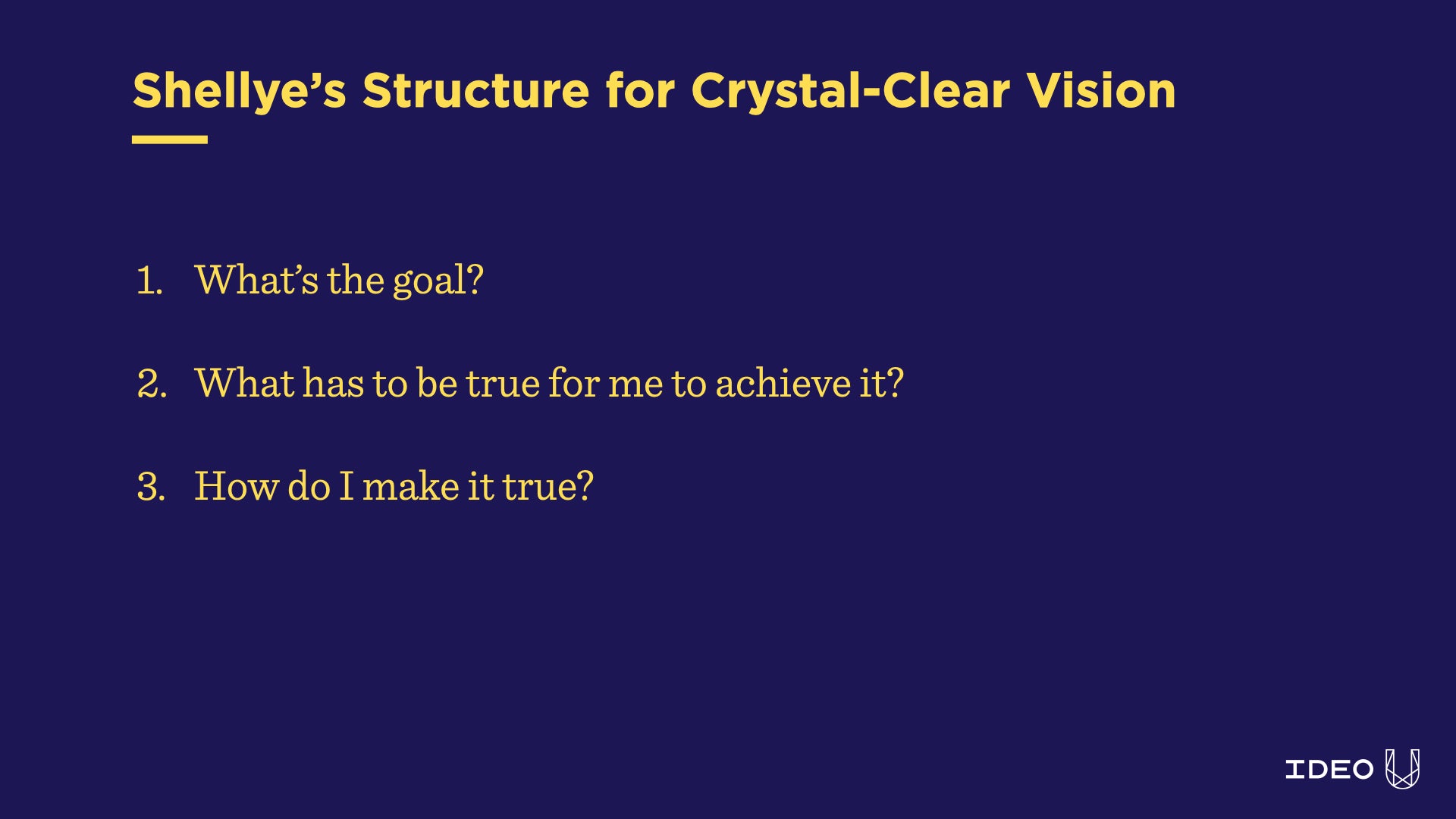Unapologetically Ambitious: Build the Career You Want
Too often, people downplay their achievements and apologize for what they want. As former CEO of MetricStream Shellye Archambeau puts it, “We use ‘I’m sorry’ like people use salt on food.”
Today, Shellye’s on a mission to change this mindset. She believes that everyone deserves to be ambitious—and that we shouldn’t have to apologize for it. As one of the few female African American CEOs in Silicon Valley, she knows what it means to own her career, writing about her lessons for success in her new book Unapologetically Ambitious.
In this episode of the Creative Confidence Podcast, Shellye talks to us about the power of committing to clear goals and how to achieve them ambitiously, unapologetically, and courageously.
Listen on Spotify or Apple Podcasts
Set a Crystal-Clear Vision
Many of us make investments into our career without truly knowing our end goal, spending thousands of dollars on education and resources along the way. In Shellye’s eyes, this makes no sense. She compares it to traveling: “You would never spend $3,000 for an airline ticket, pack your bags, board the plane, and then look at the pilot and say, ‘So where are we going, anyway?’”
Instead, Shellye believes it’s important to be intentional and accountable for our careers. “We need to own our careers, we need to decide what it is that we want, and then build the skills to get the opportunities and move forward,” explains Shellye. “Because at the end of the day, you are the only one who can optimize for you.”
This means that we should clearly define a vision of what we want to do and where we want to go. Personally, Shellye had wanted to become a CEO since she was in high school. She later refined her goal to become a CEO of a tech company, and then to join a Fortune 500 Board of Directors. While Shellye had a significant amount of foresight, she believes anyone can benefit from outlining their goals.

If you don’t have a crystal clear goal in mind, it’s helpful to just pick one. “We spend too much time trying to figure out the perfect thing,” says Shellye. “But if you pick something and work toward it, you are building skills and capabilities. Even if you decide it’s not what you want to do, you can still leverage all that you've done. I always encourage people, if you don't know what you want to do, then take jobs that are in-demand,” says Shellye.
After defining what you want to achieve, think about how you can get there—then, put all your energy into making it happen. Shellye reflects on what has to be true in order for her to achieve her goal, and then focuses entirely on execution. If a task doesn’t fit into her list of what has to be true, she doesn’t prioritize it. According to Shellye, life is all about tradeoffs and deciding how you will use your money, health, and time. To make the most of these finite resources, you should focus on what you’re trying to impact and prioritize ruthlessly.
“It's so easy to become distracted with what is important to someone else,” says Shellye. But with a north star, she’s able to cut through the noise, focus in the midst of ambiguity, and spend time on what’s most important to her.

Shellye Archambeau, Former CEO, Fortune 500 board member, author (Image Source: Silicon Valley Women)
“Everybody has the right to be ambitious, and we don’t need to apologize for it.”
Shellye Archambeau
Share What You Want
Shellye believes that a lot of success comes from simply letting people know what you want. “I'm a big believer that if you don't tell the universe what you want and what you need, the universe cannot help you,” she says. This, of course, doesn’t mean getting everything immediately—it’s about communicating your needs so that others are aware and can keep them in mind.
For example, Shellye suggests talking to people who are in a role you aspire to be in one day. You can mention how you look up to them, that you hope to follow in their footsteps, and ask about the experiences that helped them get there. This method allows you to let people know what you want to do, as well as ask for help. As Shellye mentions, “Most people want to help if you ask nicely.”
Remember that career conversations aren’t just limited to annual check-ins with HR. You can bring them up in a variety of contexts, sharing what you are trying to accomplish. “You have more opportunities than you realize to tell people what you are interested in and what you want to do,” says Shellye.
Help your team set a clear vision and work toward ambitious goals for their career growth. Learn how to be a leader who motivates your team to better outcomes. Enroll in Leading from Creativity.
Build Your Village
You can’t be successful on your own. Shellye’s advice is to surround yourself with people who motivate and encourage you. “The most important tool that you have in your toolbox is cheerleaders,” says Shellye. “When you're feeling down, they're the ones who remind you of who you are and what you're capable of. They give you that ‘rah rah, get in there and go.’”
It doesn’t matter who your cheerleaders are, whether they’re your friends, family, or work mentors—but try to surround yourself with people who build you up rather than put you down. They can inspire you to overcome your fears, build courage, and remind you that you can achieve your goals.
Shellye thinks about her relationships like a village. “A network is not how many business cards you have and how many people you have in your contacts,” explains Shellye. “A real network is people who will help you or do something for you when it's not convenient.”
How do you develop these fulfilling networks? “It’s by giving. It’s by helping others. It's by being accessible, vulnerable, and supportive,” says Shellye. You have to build relationships and invest the time and energy into them. Shellye’s village helps her execute on her career ambitions. By continuously giving, she receives so much more in return. Being generous with the people around you will help you reach your goals in the long run.
“A real network is having people who will help you when it’s not convenient.”
Shellye Archambeau
How to Build Up Courage to Do Something
If you’re ambitious, you need to raise your risk tolerance—and you do this by growing your courage. “Nobody is born with courage,” says Shellye. “Anybody you see who demonstrates courage has developed it, so you can too.” She defines courage as a willingness to be uncomfortable in the moment in order to affect something, and considers it as a muscle that you need to constantly exercise.
Shellye gives an example from her childhood, when she was beaten up after walking home from school. Yet day after day, she kept walking home. She didn’t naturally want to do it, but she learned that “when you exhibit courage, you push through.” Displaying courage can show others how committed you are to your goals and inspire others to do the same.
In her life, Shellye strives to be the first person to step forward or volunteer for something, because it helps her build her courage muscles. “The way I built courage was one step at a time,” she says. “I decided I'm going to be the first to raise my hand to step forward and volunteer—because being first to do those things sounds so simple, but honestly, it does take courage.” Once you overcome your fears and take your first steps toward building courage, you will get more comfortable with it.
“Courage is a willingness to be uncomfortable in the moment to affect something.”
Shellye Archambeau
Activity: Take Small Steps to Build Your Courage
We can overcome anything with practice. Take small steps every week to practice courage.
Step 1: With your goal in mind, figure out what is holding you back and define any fears you have.
Example: I’m not comfortable asking questions during this meeting. I fear making a mistake, looking ignorant, or embarrassing myself.
Step 2: Make yourself a promise to do one small action to confront the fear.
Example: I will ask one question in this week’s meeting.
Step 3: Have others (your cheerleaders) hold you accountable.
Example: I will tell at least one colleague my plan to speak up in the next meeting, asking them to encourage me and keep me accountable.

Remain Steady
When things get overwhelming, Shellye encourages reaching out to your cheerleaders, carving out time for self-care, and focusing on your goals. “Focus on what you can control, and what you're trying to achieve and impact at the end of the day and prioritize ruthlessly.” That will give you clarity and the ability to separate from all the noise out there. “With those things in front of you, set your priorities—not somebody else’s—yours.”
Key Takeaways: Unapologetically Ambitious
- Set Clear Goals: Define a specific vision for your career and align your efforts accordingly.
- Prioritize Ruthlessly: Focus only on what directly supports your goals and avoid distractions.
- Communicate Your Ambitions: Share your aspirations openly to invite opportunities and support.
- Build Your Village: Cultivate a strong network of cheerleaders who inspire and encourage you.
- Develop Courage: Take small, consistent steps to overcome fears and grow your confidence.
Learn more about building leadership skills that will help you lead through uncertainty and grow your team’s creative problem-solving skills in our online course, Leading for Creativity, taught by IDEO Chair Tim Brown.
- choosing a selection results in a full page refresh
- press the space key then arrow keys to make a selection



